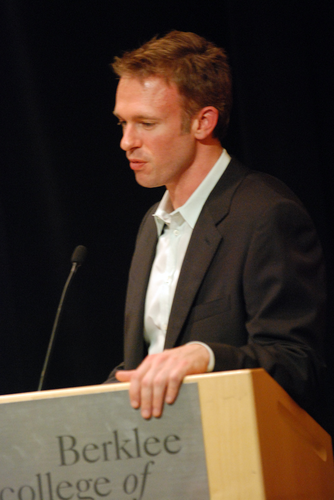Think Again at Rethink

Amanda Palmer, shown here presenting a clinic at Berklee in 2010, will cowrite and record eight songs at April's Rethink Music conference.
Photo by Michael Spencer

Faculty member Allen Bargfrede
Photo by Phil Farnsworth
New Englanders often say that everyone talks about the weather but no one does anything about it. The music industry's challenges can feel just as monolithic. At Berklee clinics, professors and guest artists talk about the breakdown of the old major-label world, the opportunities for artists to reach listeners directly—and the challenge of getting paid for it.
But despite the gray clouds that can circle these discussions, the music industry is not the weather, and someone can do something about it.
Enter Rethink Music.
Berklee's motivation in starting the conference, which will be held April 25–27 in Boston, was concrete: "We had to start doing something that fostered a viable music industry for our graduates," says Allen Bargfrede, a lawyer and assistant professor of music business/management at Berklee.
Says Roger H. Brown, president of the college, "Berklee is all about the creation of new music, and Rethink is intended to generate a very powerful discussion about ways to enhance and enrich music making. By looking at the artistic, business, and policy issues in contemporary music, we believe we can honor the vital role music has played in our lives and ensure it continues to do so."
With four organizing partners—Berklee, the Berkman Center for Internet and Society at Harvard University, Harvard Business School, and MIDEM—and over 100 presenters, the conference gathers a wide range of perspectives to consider those issues.
Berkman is "on one side of the continuum," Bargfrede says, espousing the value of open access to information. But the conference also has representatives who focus on preserving their rights. Speakers represent BMI, Google, Kickstarter, MIT, Pandora, the United States Congress, and Warner Music Group, among many other entities.
Artist guests include producer/drummer Jim Eno of Spoon and Mike Mills of REM. In a high-profile, high-wire demonstration of the speed of music today, Ben Folds, Neil Gaiman, Damian Kulash of OK Go, and Amanda Palmer are locking themselves into a studio April 25 to write and record eight songs in eight hours. They will release the songs the following morning.
And since you can't get more concrete than cash, organizers will announce the winner of a $50,000 contest to find exciting and viable new music business models. The contest drew almost 200 submissions, mostly from startups looking for funds. The winner will also receive legal services and access to venture capital.
Bargfrede, who works with both entertainment and technology in his law practice, sees a gap between the music industry and the technology companies who have done so much to change listening and distribution.
Copyright law in particular is having trouble keeping up. Due to differences in laws across countries, "Pandora, Rhapsody, Vevo. . . they're only in the United States," Bargfrede says. In France, for instance, the sites are blocked.
The three finalists address totally different aspects of the intersection of art, business, and technology. BigLife Labs offers a live virtual reality environment for musicians to jam; Fanatic.fm lets bands find sponsors for their albums; and nuevoStage gives artists the chance to book currently empty venues.
For those who can't make it to Boston, parts of the conference will be streamed online live, with real-time options to weigh in using Balloon, an interactive feedback tool. "We're soliciting feedback basically globally," Bargfrede says.
Who knows—perhaps a musician watching the live feed from his or her home 15 hours away will raise an issue that stops everyone in their tracks. The solutions could come from anywhere. . . and they're all on the table.
